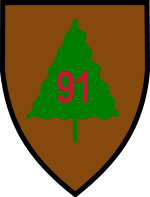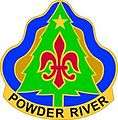91st Division (United States)
| 91st Infantry Division 91st Training Division (Operations) | |
|---|---|
 91st Infantry Division shoulder sleeve insignia | |
| Active |
1917–19 91st Infantry Division 1921–42 Inactive Reserve 1942-1945 91st Infantry Division 1946–2009 91st Training Division (USAR) 2009-2010 91st Training Brigade (USAR) 2010–present 91st Training Division (Operation) |
| Country |
|
| Branch |
|
| Type |
Infantry Training |
| Size | Division |
| Garrison/HQ | Fort Hunter Liggett[1] |
| Nickname(s) |
"Wild West Division"(special designation)[2] "Powder River"[3] |
| Motto(s) | "Powder River, Let'er Buck!" |
| Engagements | |
| Website | 91st Training Division |
| Commanders | |
| Current commander | BG Chris R. Gentry |
| Insignia | |
| Distinctive unit insignia |
 |
The 91st Infantry Division (famously nicknamed as the "Wild West Division"[2] with a "Fir Tree" as its Division insignia to symbolize its traditional home of the Far West[4]) was an infantry division of the United States Army that fought in World War I and World War II. From 1946 until 2008, it was part of the United States Army Reserve. It was briefly inactivated from 2008 until 2010 when it was elevated back to a division size element as the 91st Training Division (Operations).[1]
History
World War I and after
Constituted on 5 August 1917 at Camp Lewis, Washington, near Tacoma, the division soon thereafter departed for England in the summer of 1918. In September 1918, the division's first operation was in the St. Mihiel Offensive in France. Serving under the U.S. Army's V Corps, the division fought in the Meuse-Argonne Offensive and successfully helped to destroy the German First Guard Division and continued to smash through three successive enemy lines.[1][5]
Twelve days before the end of World War I, the division, as part of the VII Corps of the French Sixth Army, helped drive the Germans east across the Escaut River. The division was awarded separate campaign streamers for its active role in the Lorraine, Meuse-Argonne and Ypres-Lys campaigns.[1][5]
In 1919, the 91st was inactivated at the Presidio of San Francisco. After being reconstituted in 1921 as part of the Organized Reserves, the division then served as an administrative control center for the next 21 years.[1][5]
The Division was composed of the following units: [6][7][8][9][10]
-
 Headquarters, 91st Division
Headquarters, 91st Division -
 Headquarters, 181st Brigade
Headquarters, 181st Brigade
-
 361st Infantry Regiment
361st Infantry Regiment -
 362nd Infantry Regiment
362nd Infantry Regiment -
 347th Machine Gun Battalion [11]
347th Machine Gun Battalion [11]
-
-
 Headquarters, 182nd Brigade
Headquarters, 182nd Brigade
- 363rd Infantry Regiment
- 364th Infantry Regiment
- 348th Machine Gun Battalion
-
 166th Field Artillery Brigade
166th Field Artillery Brigade
- 346th Field Artillery Regiment
- 347th Field Artillery Regiment
- 348th Field Artillery Regiment
- 316th Trench Mortar Battery
-
 Divisional Troops
Divisional Troops
- 348th Machine Gun Battalion
- 316th Engineer Regiment
- 316th Medical Regiment
- 316th Ordnance Company
- 91st Division Quartermaster Train
World War II
As the early battles of World War II involving the United States were being fought in 1942, the division was reactivated at Camp White, Oregon. After initial training at Camp White, the division participation in the Oregon Maneuver combat exercise in the fall of 1943.[12][13] Then, the division departed for the European Continent. There, on the Italian Front, the 361st Regimental Combat Team was detached to participate in the battles for Rome and the Arno River. It became the first formation of the U.S. Fifth Army to reach the river. In September 1944, the division crossed the Sieve River, outflanked the famous Gothic Line, and captured the Futa Pass. For its part in combat, the division was awarded the North Apennines, Po Valley and Rome-Arno campaign streamers. The division was inactivated at Camp Rucker, Alabama, in December 1945.[1][5]
World War II statistics
Awards: MH-2 ; DSC-2 ; DSM-1 ; SS-528; LM-33; SM-43 ; BSM-4,152.
Theater: Mediterranean
Days of combat: 271
Campaigns:
Rome-Arno (22 Jan 44 - 9 Sep 44)
North Apennines (10 Sep 44 - 4 April 45)
Po Valley (5 Apr 45 - 8 May 45)
Casualties
- Total battle casualties: 8,744[14]
- Killed in action: 1,400[15]
- Wounded in action: 6,748[16]
- Missing in action: 262[17]
- Prisoner of war: 334[18]
Army Reserve
In December 1946, the 91st was reactivated at the Presidio of San Francisco as part of the U.S. Army Reserve. In 1959, the division was reorganized and redesignated as the 91st Division (Training). In 1993, the division was again reorganized and redesignated as the 91st Division (Exercise) and again in 1999 as the 91st Division (Training Support).[1][5]
Its previous headquarters were at Parks Reserve Forces Training Area (PRFTA), Dublin, California.[19]
In its 2005 Base Realignment and Closure Commission recommendations, the Department of Defense recommended relocating the 91st Division to Fort Hunter Liggett.[5]
The four brigades of the 91st Division were redesignated as separate brigades:
- 1st Brigade (PRFTA) is now 5th Brigade, 75th Division.
- 2nd Brigade (Fort Carson) is now 5th Armored Brigade.
- 3rd Brigade (Travis AFB) is now the 402nd Field Artillery Brigade.
- 4th Brigade (Fort Lewis) is now 191st Infantry Brigade.
The 91st Division moved its headquarters to Fort Hunter Liggett on 1 May 2009.[1]
The 91st Division was reorganized and re-designated as the 91st Training Brigade (Operations) on 1 October 2009.[1]
The 91st Training Brigade (Operations) was re-designated as the 91st Training Division (Operations) on 1 October 2010.[1]
Notable members
- William Borders, Army Catholic Chaplain, was awarded the Bronze Star for Valor, while serving with the 362 Infantry Regiment in bitter fighting in Italy. He later became the Archbishop of Baltimore.
- Frederick Lippitt, politician and philanthropist.
- Oscar Franklin Miller, Medal of Honor recipient.
- Deming Bronson, Medal of Honor recipient.
- Earl Warren, Chief Justice of the United States [20]
- Richard C. Oshlo, as Commanding Officer of the Division's 3rd Battalion, 361st Infantry Regiment, was the youngest Lieutenant Colonel in the U.S. Army in World War II at the age of 23. He was commanding officer of the 3rd Battalion when it won the Presidential Unit Citation for capturing Livergnano. Later he graduated 1st in his class at the Army's prestigious Command and General Staff College at Ft Leavenworth and was Mayor of Council Bluffs, Iowa, in 1964.
References
- 1 2 3 4 5 6 7 8 9 10 "91st Training Division (Operations) History". United States Army. Archived from the original on 22 July 2011. Retrieved 17 February 2011.
- 1 2 "Special Unit Designations". United States Army Center of Military History. 21 April 2010. Archived from the original on 9 July 2010. Retrieved 9 July 2010.
- ↑ Story of the Powder River 91st Infantry Division
- ↑ "Fort Baker". National Park Service. United States Department of the Interior. 20 July 2012. Retrieved 30 July 2012.
- 1 2 3 4 5 6 "91st Division (Training Support)". GlobalSecurity.org. 21 August 2008. Retrieved 17 February 2011.
- ↑ http://www.cgsc.edu/CARL/nafziger/918UKAA.pdf Nafziger collection
- ↑ The US Army Order of Battle from 1919-1941 p267
- ↑ http://usacac.army.mil/cac2/cgsc/carl/download/csipubs/OrderOfBattle/OrderofBattle2.pdf The US Army Order of Battle from 1919-1941 p866]]
- ↑ http://usacac.army.mil/cac2/cgsc/carl/download/csipubs/OrderOfBattle/OrderofBattle3.pdf p1734
- ↑ http://usacac.army.mil/cac2/cgsc/carl/download/csipubs/OrderOfBattle/OrderofBattle4.pdf P1959, P2243
- ↑ http://babel.hathitrust.org/cgi/pt?id=njp.32101073313650;view=1up;seq=10 History of the 347th Machine Gun Battalion, Retrieved 11 October 2015.
- ↑ Kramer, George, “Camp White”, The Oregon Encyclopedia, Portland State University, Portland, Oregon, 23 October 2010.
- ↑ Brogan, Phil F., East of the Cascades (Third Edition), Binford & Mort, Portland, Oregon, 1965, pp. 272–275.
- ↑ Army Battle Casualties and Nonbattle Deaths, Final Report (Statistical and Accounting Branch, Office of the Adjutant General, 1 June 1953)
- ↑ Army Battle Casualties and Nonbattle Deaths, Final Report (Statistical and Accounting Branch, Office of the Adjutant General, 1 June 1953)
- ↑ Army Battle Casualties and Nonbattle Deaths, Final Report (Statistical and Accounting Branch, Office of the Adjutant General, 1 June 1953)
- ↑ Army Battle Casualties and Nonbattle Deaths, Final Report (Statistical and Accounting Branch, Office of the Adjutant General, 1 June 1953)
- ↑ Army Battle Casualties and Nonbattle Deaths, Final Report (Statistical and Accounting Branch, Office of the Adjutant General, 1 June 1953)
- ↑ "Camp Parks Reserve Forces Training Area (PRFTA)". Camp Parks Reserve Forces Training Area (PRFTA). GlobalSecurity.org. 21 August 2008. Retrieved 17 February 2011.
- ↑ White, G. Edward (1982). Earl Warren, a public life. ISBN 0-19-503121-0. By a leading scholar
- ↑ Hald, Chris (1994). Camp White Oregon (The 91st Infantry Division). ISBN 0-936738-09-X
External links
| Wikimedia Commons has media related to 91st Infantry Division (United States). |
- 91st DIV (TS) – Web Site
- The Story of the 91st Division 1919
- 91st Infantry Division, World War I-World War II Unit History
- 91st Division official lineage & honors
- The Army Almanac: A Book of Facts Concerning the Army of the United States, U.S. Government Printing Office, 1950 reproduced at CMH.
- Answering the Call (Third Edition), Stephen L. Wilson, 2016.